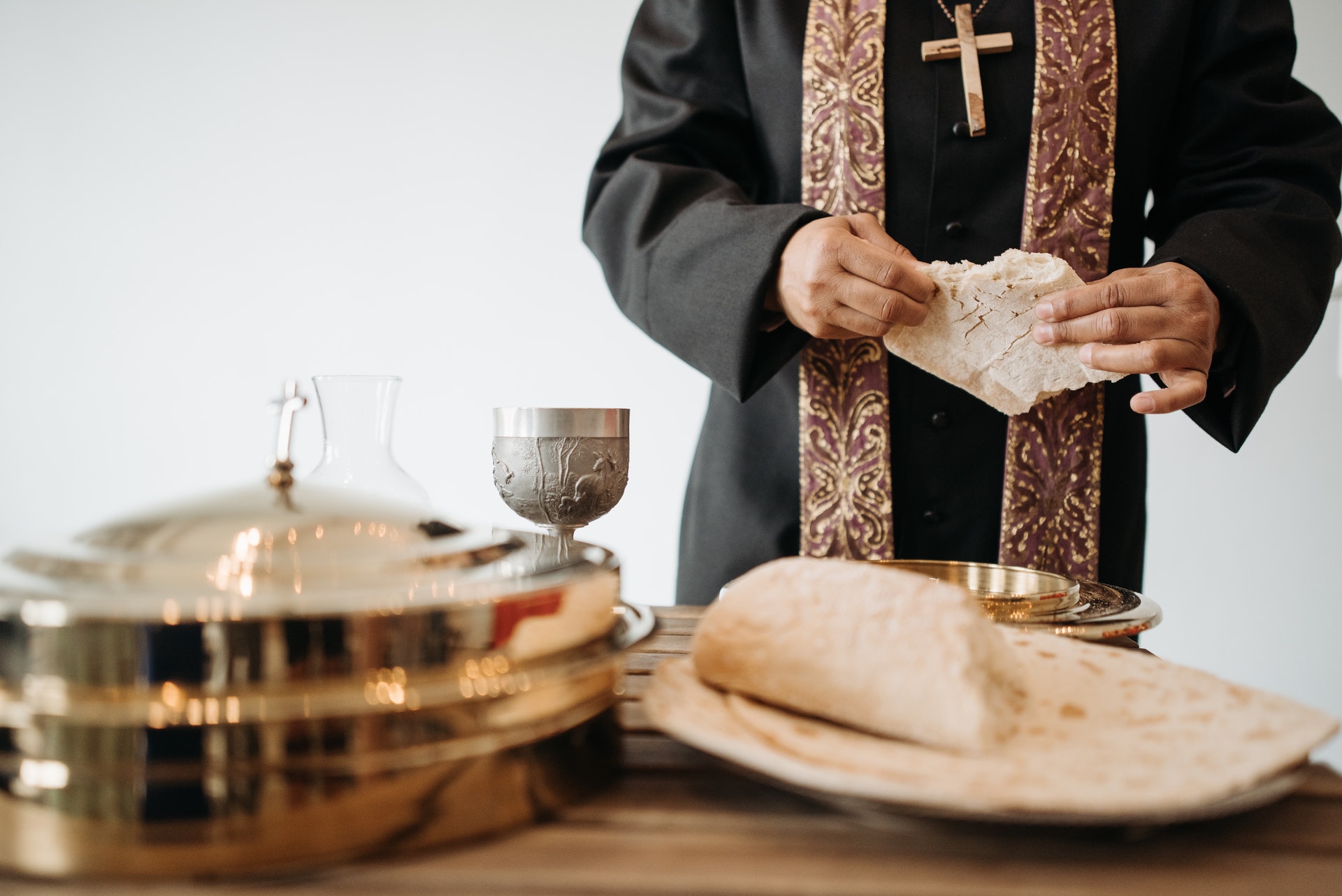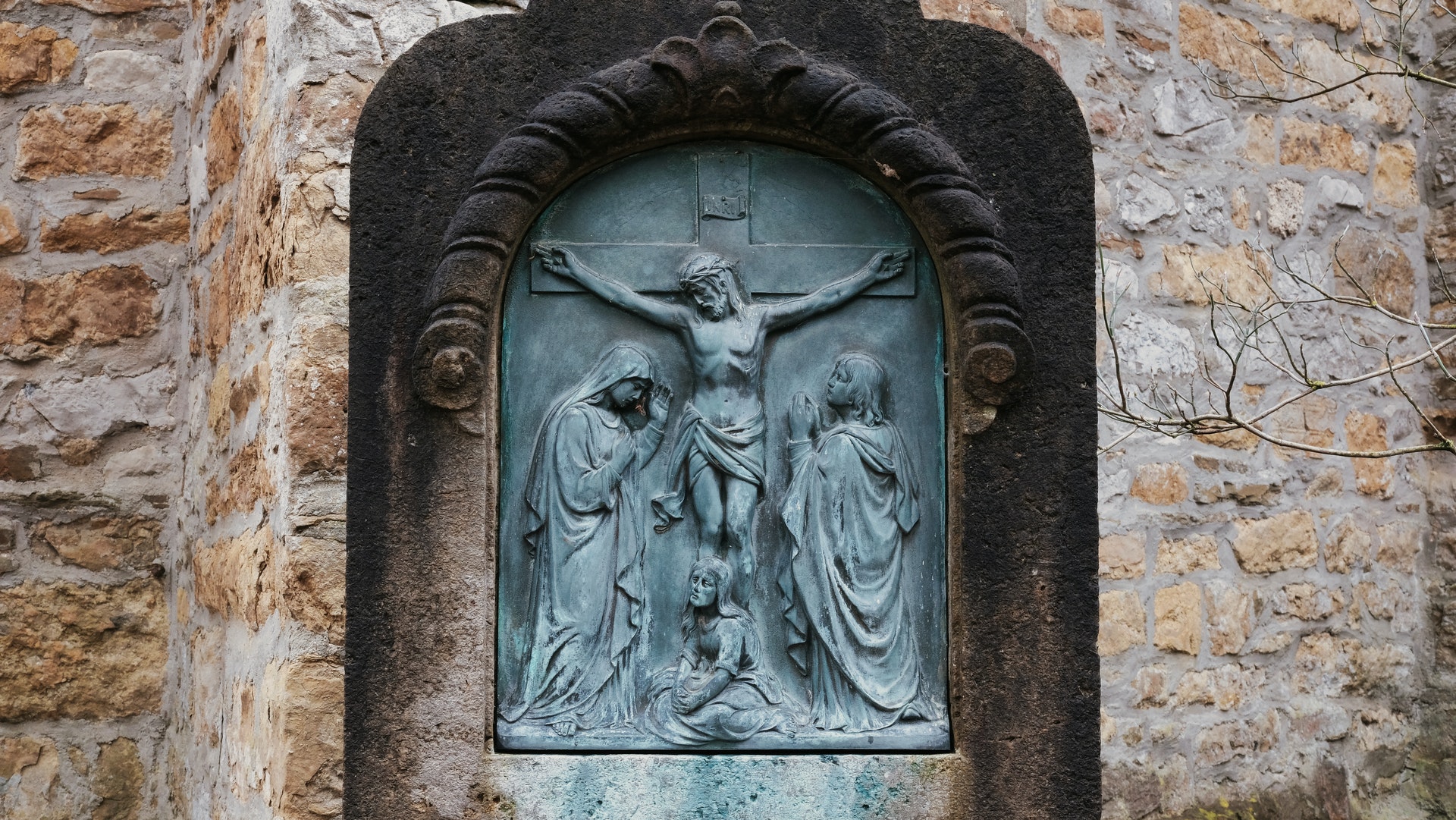Holy Food in the Judeo-Christian Tradition
By Br. Aelred
In the Judeo-Christian tradition, as in all other religious traditions, the preparation, offering, and consumption of food have a central role. Central is the understanding that God has blessed the earth so that it will be able to produce, and that man may be blessed in the eating.
The Gift of Food
The gift of food. The first present is actually food. In a certain sense, everything in God’s excellent hands is a gift, but I believe that food has a special place in the universe. Look at what God accomplishes in the creation tale in Genesis 1 of the Bible. Study the verbs in more detail: God makes, hovers, pronounces, names, divides, blesses, sees, and proclaims that it is excellent. However, he doesn’t provide it until verse 29 of the last chapter. What else does he provide? Food.

“I have given you every plant and every tree, declares God. “You shall have them for food.”
It is evident that food is a concrete manifestation of God’s grace for us when correctly seen as a gift. Food is “God’s love made consumable,” according to theologian Norman Wirzba. It is a crucial method in which Jesus demonstrates his concern for us (see Matt. 6:26). God’s common grace, which is extended for the benefit of his creation, is physically embodied in it. It’s also a useful way in which Jesus Christ keeps everything alive.
Christian Foods
Christians are not subject to any dietary or nutritional restrictions because of their religion. They hold that Jesus Christ’s life and teachings are what led to this liberation. Being Jews, Jesus and his early disciples observed the dietary regulations outlined in the Old Testament portion of the Bible. These, which date back to circa 1450 BC, prohibited Jews from eating foods like pork and seafood because they would become ill from them. But the early Church quickly realized that they were freed from the constraints that the Jews observed after Jesus.
Since the Church at that time had both Jewish and non-Jewish members, it came to an agreement that is documented in the book of Acts where followers are encouraged not to consume anything that would offend one another. This would be more about respecting one another and being culturally aware than it was about following new regulations. Christians now make the decision to choose a vegetarian or vegan lifestyle. This may be due to the environmental effects of consuming meat or other ethical considerations, much like atheists.

Alcohol Consumption
Some Christians refrain from drinking. Some Christian sects are strictly teetotal, meaning that none of the members consume any alcohol. This used to happen more frequently when beers and spirits were safer and healthier than water and there were far higher degrees of intoxication. In the 18th and 19th centuries, alcohol misuse contributed to a wide range of social issues.
The Temperance Movement was started by Christians in The US who were horrified by the issues that alcohol was producing. It advocated for moderation in drinking at first but subsequently pushed for a ban, leading to restrictions at the beginning of the 20th century. The Bible implies that Jesus ingested alcoholic beverages. At a wedding, Jesus performed the first miracle that has been documented when he changed water into wine. However, the Bible is extremely explicit in its condemnation of overeating and intoxication.
Food, Beverages, and Festivities
Significant events in the Christian life involve food and drink. In a church ceremony, Christians exchange bread and wine during communion to remember the sacrifice that Jesus made by being crucified. Christians are adhering to the directive provided by Jesus personally at what is regarded as the Last Supper by partaking in Communion and commemorating his death. His last supper before being crucified was this one. That was a Passover celebration, a unique day now observed annually by Jews to commemorate how God set them free from Egyptian slavery in approximately 1450 BC.
Before meals, Christians frequently pray or “say grace” as a symbol of gratitude for everything that God has given them.

The day before the start of Lent is traditionally a day for eating and celebration. The six-week fasting period known as Lent allows for the consumption of all luxuries. It is referred to as Pancake Day or Shrove Tuesday in the UK. In contrast, Christians frequently fast during Lent, giving up some or all meals for the duration of the season.
Eating fish instead of meat on Fridays, particularly on Good Friday, has also become a custom, notably inside the Roman Catholic Church. Because Jesus was killed on a Friday, it is believed that this is done as a sign of respect.
Biblical References on Foods
Let us look at a variety of Biblical references to holy food. There is a vital passage at the end of Chapter 1 of Genesis— the first reference to food in the Bible, and the first reference to the food which has been given to Adam and Eve, our first parents: God said, “See, I give you all the seed-bearing plants that are upon the whole earth, and all the trees with seed-bearing fruit; this shall be your food…”
One Catholic priest recently told me, “Your commitment to a vegetarian diet is justified by reference to Scripture.” He was, of course, referring to the above verse. It is fascinating (and disturbing) that Christians consistently overlook (ignore?) this passage, and choose to follow the less desirable diet given following the Great Flood— the diet that allowed meat-eating. Whenever I raise this matter there is an awkward silence…then a flow of excuses!
In the Old Testament book of Leviticus, chapter 22, there is a lengthy passage on the subject of holy food: Yahweh spoke to Moses; he said: “Speak to Aaron and his sons: let them be consecrated through the holy offerings of the sons of Israel… “Any one of your descendants, in any generation, who in a state of uncleanness approaches the holy offerings consecrated to Yahweh by the sons of Israel, shall be outlawed from my presence… “…At sunset, he will be clean and may then eat holy things, for these are his foods… “They (lay people) must not profane the holy offerings which the sons of Israel have set aside for Yahweh. To eat these would lay on them a fault demanding a sacrifice of reparation; for it is I, Yahweh, who have sanctified these offerings.”
We obviously have a greater interest in the New Testament, especially as it has to do with “the best son of God,” Jesus. Bhagavad-gita commentator, Swami Prabhupada referred to Jesus in these words. In the New Testament, we have two themes of central importance: 1. The sharing of food by believers or devotees. In Acts 2: 42-47 we read the following – These (the early Christian community) remained faithful to the teaching of the apostles, to the brotherhood, to the breaking of bread, and to the prayers. The faithful all lived together and owned everything in common; they sold their goods and possessions and shared the proceeds among themselves according to what each one needed. They went as a body to the Temple every day but met in their houses for the breaking of bread; they shared their food gladly and generously; they praised God and were looked up to by everyone.
In his First Letter to the Corinthians, St. Paul writes: Whatever you eat, whatever you drink, whatever you do at all, do it for the glory of God… Later in the letter, St. Paul deals at length (Chapter 11) with the whole subject of eating food. He is scathing in his criticism of the behavior of some, specifically because the eating of food is presented in the context of The Eucharist or the Lord’s Supper. I will quote the whole passage since, outside the Gospels themselves, it is the most important teaching on the subject of holy food.
The Lord’s Supper
Now that I am on the subject of instructions, I cannot say that you have done well in holding meetings that do you more harm than good. In the first place, I hear that when you all come together as a community, there are separate factions among you, and I half believe it–since there must no doubt be separate groups among you, to distinguish those who are to be trusted. The point is, when you hold meetings, it is not the Lord’s Supper that you are eating since when the time comes to eat, everyone is in such a hurry to start his own supper that one person goes hungry while another is getting drunk.

Surely you have homes for eating and drinking in? Surely you have enough respect for the community of God not to make poor people embarrassed? What am I to say to you? Congratulate you? I cannot congratulate you on this. For this is what I received from the Lord, and in turn, passed on to you: that on the same night that he was betrayed, the Lord Jesus took some bread, and thanked God for it and broke it, and he said, ‘This is my body, which is for you; do this as a memorial of me.’ In the same way, he took the cup after supper, and said, ‘This cup is the new covenant in my blood. Whenever you drink it, do this as a memorial of me.’
Until the Lord comes, there, every time you eat this bread and drink this cup, you are proclaiming his death, and so anyone who eats the bread or drinks the cup of the Lord unworthily will be behaving unworthily toward the body and blood of the Lord. Everyone is to recollect himself before eating this bread and drinking this cup; because a person who eats and drinks without recognizing the Body is eating and drinking his own condemnation. In fact, that is why many of you are weak and ill and some of you have died. If only we recollected ourselves, we should not be punished like that. But when the Lord does punish us like that, it is to correct us and stop us from being condemned by the world. So to sum up, my dear brothers, when you meet for the Meal, wait for one another.
Anyone who is hungry should eat at home, and then your meeting will not bring your condemnation. The other matters I shall adjust when I come. In conclusion, I would say that prasadam holds a central place in the Christian tradition, although with an added dimension. By “added dimension” I mean that, in the Eucharist/Mass/Lord’s Supper, not only are the bread and wine offered to God, and so set apart from mundane use, they actually manifest the presence of Jesus Christ. Jesus Christ is actually present in every Mass. Indeed the bread and wine are the worshipable forms of the Lord. Such is the Catholic and Orthodox doctrine of the “Real Presence.”
FAQs
Bread and wine are associated with the Lord’s Supper. Tradition has it that during his final supper with his apostles, Jesus Christ set down wine and unleavened bread; He identified the items as remembrances of his body and blood.
There are often no dietary limitations. People can decide whether or not to drink alcohol. Christians may abstain from eating particular items during Lent.
Good cookery, particularly dishes with vegetables, helped make the feasts—which included Easter and Christmas—special during the Christian year. In fact, following his resurrection, Jesus personally prepared and consumed fish in the company of numerous disciples (John 21.9-13).

Get Your Copy of FOOD YOGA Today!
Author Paul Rodney Turner the “food yogi” takes you on a journey of rediscovering food and its importance in our spiritual evolution.
– Learn how to make food part of your spiritual journey
– Take back control of your dinner table
– Learn the ancient yoga practice of mastering the senses
– Get practical guidance on obtaining a healthy body, mind, and soul
– Learn about the sacred geometry of food
FOOD YOGA not only offers practical guidance on how to live a healthy and happy life by reconnecting with nature but also introduces the reader to the power of food as a uniter and a medium for expressing our love for the divine.
